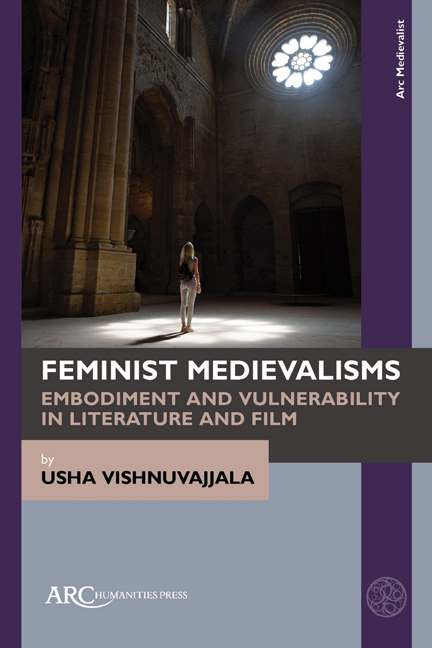Book contents
- Frontmatter
- Contents
- Acknowledgements
- Introduction
- Chapter 1 Nested Medievalisms and Affected Bodies in Jane Austen’s Northanger Abbey
- Chapter 2 Feminism and Medievalism in Woolf’s Final Works
- Chapter 3 Medievalism as Feminist Sanctuary in the late Twentieth Century
- Chapter 4 Chaucer, Vulnerable Bodies, Somatophobia, and Theory
- Conclusion: Feminisms and Medievalisms
- Select Bibliography
- Index
Introduction
Published online by Cambridge University Press: 28 March 2024
- Frontmatter
- Contents
- Acknowledgements
- Introduction
- Chapter 1 Nested Medievalisms and Affected Bodies in Jane Austen’s Northanger Abbey
- Chapter 2 Feminism and Medievalism in Woolf’s Final Works
- Chapter 3 Medievalism as Feminist Sanctuary in the late Twentieth Century
- Chapter 4 Chaucer, Vulnerable Bodies, Somatophobia, and Theory
- Conclusion: Feminisms and Medievalisms
- Select Bibliography
- Index
Summary
MEDIEVALISM STUDIES, the study of the reception of and engagement with medieval culture, has grown enormously in recent decades despite its frequent exclusion from the wider field of medieval studies until very recently. Although this has enabled medievalism studies to be interdisciplinary, to welcome non-traditional academics, to study right-wing appropriations of medieval culture before it was popular in medieval studies, and to embrace practitioners alongside scholars, it has also meant, at times, that it has been slower to adopt methodological developments in fields like literary and media studies, particularly when it comes to gender and recuperating women’s voices. Despite some notable exceptions, the field of medievalism studies has tended to focus more on representations of institutional history, martial culture, or men’s writing, and on post-medieval engagements that are produced or enacted primarily by men. When work on medievalism focuses on women, it has tended to focus on misogyny and violence against women, on exceptionally powerful women, or on women as exceptions in otherwise masculinist texts or spaces.
This book initially aimed to intervene in existing theories of embodied or participatory medievalism to ask what such a medievalism might look like with a focus on women doing the participating, and then looking for representation of such medievalism in literary and cinematic texts. Medievalism, as Louise D’Arcens has recently written, is difficult to define because it “embraces a range of cultural practices, discourses, and material artifacts with a daunting breadth of scope, temporally, geographically, and culturally” and it “has had a ubiquitous but often under-recognised presence in…cultural memory.” My interest is in bringing out that presence in texts and media that we might consider feminist but might not consider overtly medievalist—work by Jane Austen, Virginia Woolf, Madonna’s music video for “Like a Prayer,” the 1992 film Sister Act, recent political discourse around misogyny and sexual harassment—and considering how it can help to define feminist medievalism in a way that adds to our understanding of texts we do consider overtly medievalist and our understanding of how medievalism shapes our cultures and experiences today.
- Type
- Chapter
- Information
- Feminist MedievalismsEmbodiment and Vulnerability in Literature and Film, pp. 1 - 18Publisher: Amsterdam University PressPrint publication year: 2024



